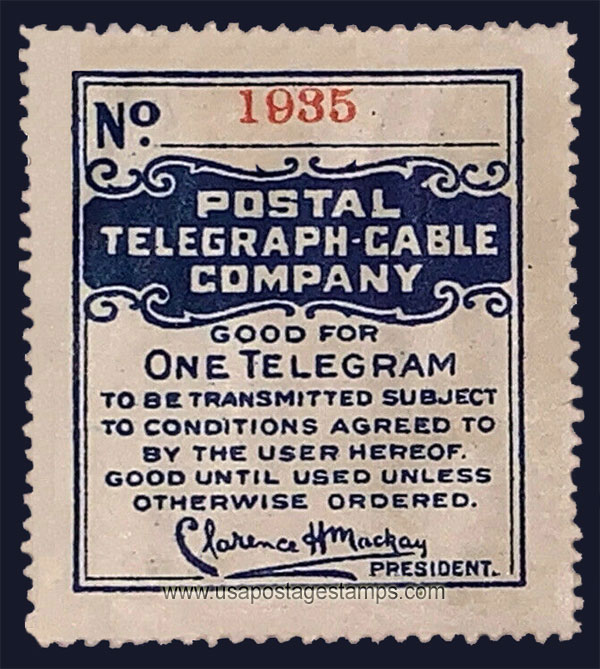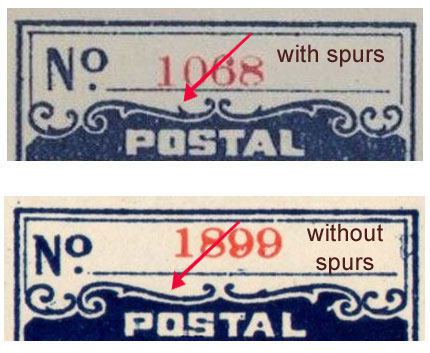US 1914 Postal Telegraph-Cable Company 'Frank' 0c. Barefoot P52a


Series: Postal Telegraph-Cable Company
Issued year: 1914
Face value: 0c. (None º - No Face Value)
Emission: Telegraph & Telephone
Watermark: No Watermark
Catalogue No:-
Scott (UK): Unlisted
Barefoot (UK): P52a
Stamp Colors: Dark blue
Perforation: 14
Paper: Medium or thick, wove
Themes: Telegraph, Signature, Autograph
Note: With spurs above "POSTAL". With unique control number in red.
Signature of the Company's President, Clarence H. Mackay.
Perforated on all sides.
Issued year: 1914
Face value: 0c. (None º - No Face Value)
Emission: Telegraph & Telephone
Watermark: No Watermark
Catalogue No:-
Scott (UK): Unlisted
Barefoot (UK): P52a
Stamp Colors: Dark blue
Perforation: 14
Paper: Medium or thick, wove
Themes: Telegraph, Signature, Autograph
Note: With spurs above "POSTAL". With unique control number in red.
Signature of the Company's President, Clarence H. Mackay.
Perforated on all sides.
Description:- Postal Telegraph Company (Postal Telegraph & Cable Corporation) was a major operator of telegraph networks in the United States prior to its consolidation with Western Union in 1943. Postal partnered with Commercial Cable Company for overseas cable messaging.
Postal was founded in the 1880s by John William Mackay, an entrepreneur who had made a fortune in silver mining in the Comstock Lode. Mackay's original purpose was to provide a domestic wire network to directly link with the Atlantic Cable. Mackay built the Postal network by the purchase of existing insolvent firms. The company was initially called The Pacific Postal Telegraph Cable Co.[2] Under president Albert Brown Chandler, the Postal network was able to achieve sufficient economy of scale to compete with Western Union, occasionally controlling as much as 20% of the business.
By 1893, the company's rate of growth had allowed it to become the only viable competitor to Western Union. It had grown so large that management had to move out of the company's New York City headquarters to accommodate more operations staff. Chandler oversaw the design and construction of the Postal Telegraph Company Building, a new headquarters at Broadway and Murray Street.
Source: en.wikipedia.org/wiki/Postal_Telegraph_Company
Postal was founded in the 1880s by John William Mackay, an entrepreneur who had made a fortune in silver mining in the Comstock Lode. Mackay's original purpose was to provide a domestic wire network to directly link with the Atlantic Cable. Mackay built the Postal network by the purchase of existing insolvent firms. The company was initially called The Pacific Postal Telegraph Cable Co.[2] Under president Albert Brown Chandler, the Postal network was able to achieve sufficient economy of scale to compete with Western Union, occasionally controlling as much as 20% of the business.
By 1893, the company's rate of growth had allowed it to become the only viable competitor to Western Union. It had grown so large that management had to move out of the company's New York City headquarters to accommodate more operations staff. Chandler oversaw the design and construction of the Postal Telegraph Company Building, a new headquarters at Broadway and Murray Street.
Source: en.wikipedia.org/wiki/Postal_Telegraph_Company




